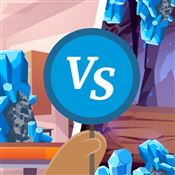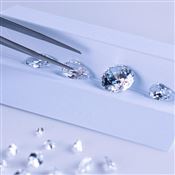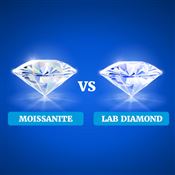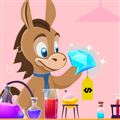Pros and Cons of Lab Grown Diamonds
Lab diamonds are real diamonds at a fraction of the price. But are they worth it? Here are the pros and cons to help you decide.
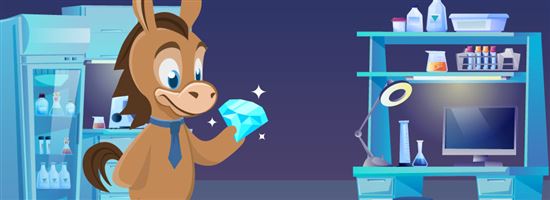 |
You're not the only one confused about lab diamonds.
Some think they're the future of the diamond scene. But some will also say that you're better off with another stone. So should you still buy lab diamonds?
Lab diamonds are becoming popular alternatives to natural diamonds. But they also have downsides to consider. Below are the benefits of lab diamonds and why they may not be for you.
Are Lab Diamonds as Good as Natural Diamonds?
Lab diamonds are real diamonds. They're as good as natural diamonds because they're identical. They share the same chemical and physical properties.
Lab diamonds are as brilliant and durable as their natural twins.
The only difference is in where they came from. Natural diamonds are formed deep beneath the earth. Whereas lab diamonds are made by mimicking the same process inside a laboratory.
Can Jewelers Tell Lab Diamonds?
Jewelers and gemologists can't tell lab diamonds through traditional tools. Diamond testers can't detect them, either.
The only way to confirm the origin of your diamond is to test it at specialized gem laboratories. Today, jewelers are also starting to use lab diamond testers, such as GIA's iD100. However, these devices can be expensive and vary in accuracy.
Pros and Cons
 |
Lab diamonds and natural diamonds are the same. But they still have differences in price, resale value, quality, and more.
Together, these differences give lab diamonds advantages and disadvantages over their natural counterparts.
Lab Diamond Pros
- Cheaper real diamonds
Lab diamonds cost around 60%-70% less than natural diamonds. This means you can buy a real diamond for about a third of the price.Take the diamond collection of James Allen for example. Their 1-carat F VS1 excellent round natural diamonds retail for at least $6,970*. Meanwhile, their lab diamonds of the same quality cost as little as $1,650.
*Prices as of June 19, 2022
- Better quality
It's easier to make higher-quality diamonds by growing them inside laboratories. Lab diamonds grow under controlled conditions. That's why they're more likely to receive higher color and clarity grades.You don't have to worry so much about getting a diamond with visible flaws or color tint.
Lab diamonds can also surpass natural diamonds in cut quality. They contain fewer imperfections. Synthetic roughs are also more uniform in shape. As a result, cutters have fewer constraints to come up with the best diamond cut.
- More environmentally friendly
You don't need to displace hundreds of tons of soil to make lab diamonds. That's acres of forests and watersheds saved. Creating lab diamonds doesn't cause as much irreversible damage, unlike their mined counterparts.But lab diamonds are not spared from environmental impact. Producing them emits high amounts of greenhouse gas. Still, their environmental footprint remains lower compared to natural diamonds.
- Ethical sourcing
Lab diamonds are conflict-free. They're made inside the safe conditions of laboratories. So, you don't risk buying stones extracted by enslaved workers to fund wars. - Less expensive to insure
Lab diamonds are cheaper to replace and insure. They also come with grading reports and appraisal forms to verify their value. Making them just as protected from theft, damage, travel, and more. - More affordable colored diamonds
Always wanted to stand out with a pink, blue, or yellow diamond? Natural fancy colored diamonds are rare and super-expensive. But colored lab diamonds cost a fraction of the price..Fun fact: Red diamonds are the rarest of all colored diamonds. Only 20 to 30 are known to exist in the whole world.
Lab Diamond Cons
- No resale value
The resale value of all diamonds is generally weak. You can't resell any diamond for a profit. But it's worse for lab-grown.Lab diamonds have zero resale value. Because they're mass-produced, they don't hold value for being rare. In the future, they'll get even cheaper due to advances in technology. If you plan on reselling your lab-grown, you'd be lucky to get 10% of what you paid for it.
- Not rare
Mass-produced stones are a downside if you or your partner value rarity. You don't get unique, one-of-a-kind stones. - Prejudice against lab diamonds
Not everyone appreciates lab diamonds. Some, even your partner, may just prefer a natural stone.If you buy a lab-grown diamond, best prepare yourself for the occasional rumors that you're owning a fake diamond. Or that you're a cheapskate.
- Fewer insurance providers
It's cheaper to insure a lab diamond. But some jewelers warn that insurance policies for them may be harder to come by.Still, others say that insuring them is not a problem at all. In any case, be sure that you have your insurance options ready before buying a lab diamond.
Lab Diamond vs Other Diamond Alternatives
 |
Still not sure if a lab diamond is the best for you?
See how they compare to other diamond alternatives. Note that cubic zirconias and moissanites are only diamond simulants. Unlike lab diamonds, they're not real diamonds.
| Natural Diamond | Lab Diamond | Moissanite | Cubic Zirconia | |
|---|---|---|---|---|
| Composition | Carbon | Carbon | Silicon carbide | Zirconium dioxide |
| Creation | Deep in earth | Lab | Lab | Lab |
| Cost | Can be very expensive | Up to 70% less | Up to 90% less | Super cheap |
| Hardness (Mohs scale) | 10 | 10 | 9.25-9.5 | 8.5 |
| Refractive Index (brilliance) | 2.417-2.419 | 2.417-2.419 | 2.65-2.69 | 2.15-2.18 |
| Quality | Range of quality | Usually higher color and clarity | Usually higher color and clarity | Perfectly flawless and colorless |
Lab Diamond vs. Cubic Zirconia
Cubic zirconia is a man-made, diamond-looking stone. They're cheap and sometimes treated as disposable.
Compared to diamonds, cubic zirconias are always white and flawless. But they're not as brilliant. And instead of a diamond's white sparkle, they radiate rainbow lights. They can also chip and get cloudy after a few years.
Lab Diamond vs Moissanite
Moissanite is a natural white gemstone discovered on a meteorite. They're super-rare, so most moissanites today are also lab-grown.
Moissanites are super-durable and won't scratch and get cloudy. They rank 9.25 to 9.5 on the Mohs hardness scale. That's almost like a diamond's perfect 10. That's why they're also forever stones, but for a fraction of a diamond's price.
Like cubic zirconia, moissanites also emit rainbow sparkles. But they're more brilliant than diamonds, so you get a very flashy ring.
Are Lab Diamonds Worth It?
This depends on what "worth it" means for you.
Lab diamonds' financial, environmental, and ethical benefits are enough to make many people switch. But they might not be for you if you're bothered by their synthetic origin, lack of rarity, and zero resale value.
If you think lab diamonds are worth it, here are three of the best places where you can buy them.
Best Places to Buy Lab Diamonds
Bottom Line
We hope we've helped you understand the pros and cons of lab-grown diamonds. They have lots of advantages to boot. But they also have downsides that may be deal-breakers to some people.
Ultimately, deciding if a lab diamond is worth it is a matter of personal preference. Buying a diamond is a huge decision. So take the time to learn about your needs.
Also, talk to your partner about this. In the end, what matters is you're both happy with the gem that symbolizes your love.
Write to Chesca Santiago at feedback@creditdonkey.com. Follow us on Twitter and Facebook for our latest posts.
Note: This website is made possible through financial relationships with some of the products and services mentioned on this site. We may receive compensation if you shop through links in our content. You do not have to use our links, but you help support CreditDonkey if you do.
|
|
|





